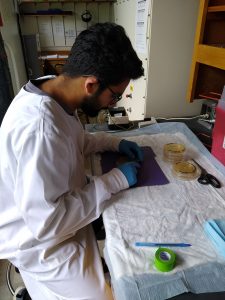Can Essential Oils Defeat “the Superbugs”?
By Asad Ali
I am currently a rising fourth-year at the University of Virginia, majoring in Environmental Sciences.
This summer, I am researching the effectiveness of alternative medicine, namely essential oils, as antimicrobials. This research aims to help us reduce antibiotic use, addressing concerns over the risks of antibiotics inducing resistance in the very bacteria they are meant to treat, resulting in “the superbugs”. I am working with Corynebacterium pseudotuberculosis, a biosafety level 2 (BSL2) bacterium which causes an illness called caseous lymphadenitis in small ruminants (goats and sheep), cattle, horses, and occasionally humans. In the lab, I compare how this bacterium grows when exposed to antibiotics, essential oils and their components, or no treatment. My experiment requires exposing the bacteria to these treatments in multiple iterations to observe any changes in bacterial activity over time. Additionally, I am analyzing the differences in DNA from the multiple strains of bacteria grown during each iteration of my experiment to test for development of antimicrobial resistance to the essential oils or their components.
I’ve always been interested in the ideas surrounding One Health. I believe that living in an interconnected world requires a multidisciplinary and collaborative approach to solve common issues in human, wildlife, and ecosystem health. As an ecologist and aspiring doctor, I hope to contribute to an open discussion on how health is in fact deeply connected with the environment and one’s surroundings. Health does not exist in a vacuum, after all, but rather can be impacted by a wide variety of factors from climate and geography to socioeconomic status and access to healthcare. The One Health perspective can allow us to better understand these issues at hand and work to find a solution.
This blog post was authored by a student participating in the Research Experience for Undergraduates – Accelerating New Environmental Workskills program, which is led by faculty in the Initiative for One Health and the Environmental and funded by the National Science Foundation. Information in this post does not represent the University of Maine or its faculty.
